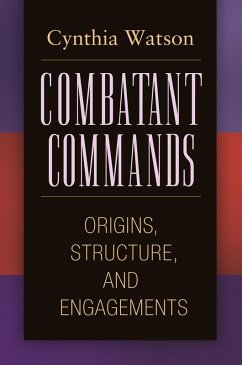A one-stop resource for information about U.S. military commands and their organizations, this book describes the six geographic combat commands and analyzes their contributions to national security.
The first book on the topic, Combatant Commands: Origins, Structure, and Engagements is a unique introduction to the geographic commands that are now at the heart of the U.S. military deployment abroad. The book begins with a description of the six commands-Northern Command, Pacific Command, Central Command, Southern Command, European Command, and Africa Command-explaining how they fit into the current national security establishment. Each command is discussed in depth, including areas of responsibility, subcommands, priorities, threats faced, and engagement institutions.
The history of joint combatant commands is outlined as well, particularly the impact of the Root Reforms of the early 20th century, the push for the 1947 National Security Act, and the 1986 Goldwater-Nichols Military Reform Act. In this way, the evolution of combatant commands becomes a window through which to view changes in the U.S. military. Geographic combatant commands are vital to national security. By understanding how they work, readers will better understand where our military is today and where it may be headed.
The first book on the topic, Combatant Commands: Origins, Structure, and Engagements is a unique introduction to the geographic commands that are now at the heart of the U.S. military deployment abroad. The book begins with a description of the six commands-Northern Command, Pacific Command, Central Command, Southern Command, European Command, and Africa Command-explaining how they fit into the current national security establishment. Each command is discussed in depth, including areas of responsibility, subcommands, priorities, threats faced, and engagement institutions.
The history of joint combatant commands is outlined as well, particularly the impact of the Root Reforms of the early 20th century, the push for the 1947 National Security Act, and the 1986 Goldwater-Nichols Military Reform Act. In this way, the evolution of combatant commands becomes a window through which to view changes in the U.S. military. Geographic combatant commands are vital to national security. By understanding how they work, readers will better understand where our military is today and where it may be headed.









